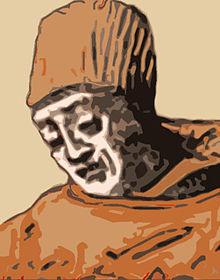Our website is made possible by displaying online advertisements to our visitors.
Please consider supporting us by disabling your ad blocker.
Marsilius of Padua
Marsilius of Padua | |
|---|---|
 | |
| Born | c. 1270 |
| Died | c. 1342 Munich, Duchy of Upper Bavaria, Holy Roman Empire |
| Education | University of Paris |
| Notable work | Defensor pacis |
| Era | 14th-century philosophy Medieval philosophy |
| Region | Western philosophy |
Main interests | |
You can help expand this article with text translated from the corresponding article in German. (June 2021) Click [show] for important translation instructions.
|

Marsilius of Padua (Italian: Marsilio da Padova; born Marsilio Mainardi, Marsilio de i Mainardini or Marsilio Mainardini; c. 1270 – c. 1342) was an Italian scholar, trained in medicine, who practiced a variety of professions. He was also an important 14th-century political figure. His political treatise Defensor pacis (The Defender of Peace), an attempt to refute papal claims to a "plenitude of power" in affairs of both church and state, is seen by some scholars as the most revolutionary political treatise written in the later Middle Ages.[1] It is one of the first examples of a trenchant critique of caesaropapism in Western Europe.[2] Marsilius is sometimes seen as a forerunner of the Protestant reformation, because many of his beliefs were later adopted by Calvin and Luther.[3]
- ^ Mulieri, Alessandro (2023). "Theorizing the multitude before Machiavelli. Marsilius of Padua between Aristotle and Ibn Rushd". European Journal of Political Theory. 22 (4): 542–564. doi:10.1177/14748851221074104. ISSN 1474-8851. S2CID 246587791.
- ^ Hahn, Scott & Wiker, Benjamin (2013). Politicizing the Bible: The Roots of Historical Criticism and the Secularization of Scripture 1300-1700. Chapter 2: "The First Cracks of Secularism: Marsilius of Padua and William of Ockham": Herder & Herder. pp. 17–59 passim.
{{cite book}}: CS1 maint: location (link) - ^ "Philip Schaff: History of the Christian Church, Volume VI: The Middle Ages. A.D. 1294-1517 - Christian Classics Ethereal Library". ccel.org. Retrieved 2021-12-23.
Previous Page Next Page


